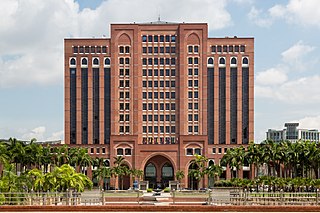
The economy of São Tomé and Príncipe, while traditionally dependent on cocoa, is experiencing considerable changes due to investment in the development of its oil industry in the oil-rich waters of the Gulf of Guinea.
A per capita GDP of $3,200 ranks Solomon Islands as a lesser developed nation. Over 75% of its labour force is engaged in subsistence farming and fishing.
Tun Dr. Lim Keng Yaik was a Malaysian politician and former Minister of Energy, Water and Communications in the Malaysian cabinet. He was the third president of Parti Gerakan Rakyat Malaysia (Gerakan) from 1980 until stepping down on 8 April 2007 to pave the way for Tan Sri Koh Tsu Koon. Just before his death, he was among the only four living Chinese with Tunship holders in Malaysia.
The Congress of Union of Employees in the Public and Civil Services Malaysia, abbreviated CUEPACS, is a national trade union centre in Malaysia. It has a membership of 1,200,000.

Bachok District is an administrative division of Kelantan, Malaysia. It is located approximately 25 km east of Kota Bharu.

The Malaysian Rubber Board is the custodian of the rubber industry in Malaysia. Established on 1 January 1998, it has under its fold three agencies, which are now merged into one. The R&D work in natural rubber, accomplished by the Rubber Research Institute of Malaysia, has been used by the Malaysian natural rubber industry and other NR producing countries.

The Malaysian Palm Oil Board, abbreviated MPOB, is a government agency responsible for the promotion and development of the palm oil industry in Malaysia. It is one of the agencies under the Ministry of Plantation Industries and Commodities.

Olam International is a major food and agri-business company, operating in 60 countries and supplying food and industrial raw materials to over 20,900 customers worldwide. Its value chain includes farming, origination, processing and distribution operations.

Agriculture in Indonesia is one of the key sectors within the Indonesian economy. In the last 50 years, the sector's share in national gross domestic product has decreased considerably, due to the rise of industrialisation and service sector. Nevertheless, for the majority of Indonesian households, farming and plantation remains as a vital income generator. In 2013, the agricultural sector contributed 14.43% to national GDP, a slight decline from 2003's contribution which was 15.19%. In 2012, the agricultural sector provides jobs to approximately 49 million Indonesians, representing 41% of the country's total labor force.

Agriculture in Ghana consists of a variety of agricultural products and is an established economic sector, providing employment on a formal and informal basis. It is represented by the Ministry of Food and Agriculture. Ghana produces a variety of crops in various climatic zones which range from dry savanna to wet forest which run in east–west bands across Ghana. Agricultural crops, including yams, grains, cocoa, oil palms, kola nuts, and timber, form the base of agriculture in Ghana's economy. In 2013 agriculture employed 53.6% of the total labor force in Ghana.
Elementis plc is one of the UK's largest speciality chemicals and personal care businesses, with extensive operations in the United States, Europe and Asia. It is listed on the London Stock Exchange and is a constituent of the FTSE 250 Index.

The Ministry of Home Affairs, abbreviated KDN, MOHA, is a ministry of the Government of Malaysia that is responsible for home affairs: law enforcement, public security, public order, population registry, immigration, foreign workers, management of societies, anti-drug, publication / printing / distribution of printed materials, film control, management of volunteer, rehabilitation and implementation of punishment.
This article addresses various criticisms of Cargill Inc, a privately held "agribusiness" multinational giant" with operations in 70 countries and its headquarters in Minneapolis, Minnesota, in the United States. Cargill Inc, which has been owned by the Cargill family for 154 years, is the largest privately owned corporation in the United States, with an annual revenue of $113.5 billion in 2019.

The Federal Land Development Authority is a Malaysian government agency that was founded to handle the resettlement of rural poor into newly developed areas and to organize smallholder farms growing cash crops.

Agriculture in Malaysia makes up twelve percent of the nation's GDP. Sixteen percent of the population of Malaysia is employed through some sort of agriculture. Large-scale plantations were established by the British. These plantations opened opportunity for new crops such as rubber (1876), palm oil (1917), and cocoa (1950). A number of crops are grown for domestic purpose such as bananas, coconuts, durian, pineapples, rice and rambutan.

The Ministry of Transport, abbreviated MOT, is a ministry of the Government of Malaysia that is responsible for transport: road transport, civil aviation, marine, road safety, port authority, railway assets, maritime, air accident investigation, logistic, maritime safety, shipping, rail transport, airport, airline.

The Ministry of Rural and Regional Development is a ministry of the Government of Malaysia that is responsible for rural development, regional development, community development, Bumiputera, Orang Asli, rubber industry smallholders, land consolidation, land rehabilitation.
Sarawak Land Development Board (SLDB) was a Malaysian body corporate active in palm oil industry and other industries founded in 1972.

The economy of Sarawak is the fourth-largest of the states of Malaysia, making up 9.3% of the Malaysian gross domestic product (GDP) in 2022. Meanwhile, Sarawak is home to 7.9% of the Malaysian population based on the 2020 census.












